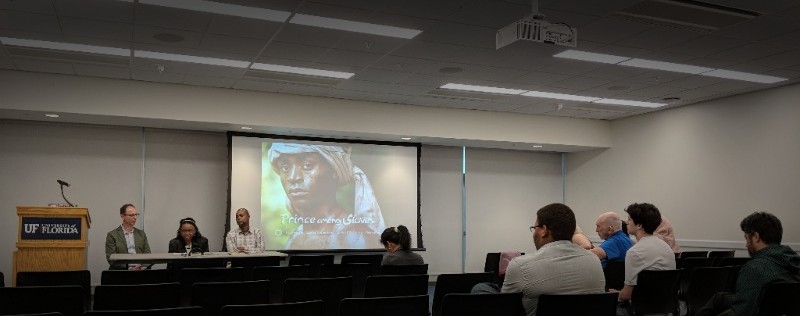 On February 13, the Center for Global Islamic Studies and the Religion Graduate Student Association co-sponsored a screening of the documentary, “Prince Among Slaves.” The film tells the story of Abdul Rahman Ibrahima Sori, an African prince who was sold into slavery in the American south.
On February 13, the Center for Global Islamic Studies and the Religion Graduate Student Association co-sponsored a screening of the documentary, “Prince Among Slaves.” The film tells the story of Abdul Rahman Ibrahima Sori, an African prince who was sold into slavery in the American south.
Abdul-Rahman was captured in 1788 while he and an army of 2000 soldiers were expanding Futa Jallon, the territory ruled by his father, Almami Ibrahim Sori. Abdul-Rahman and his men were quickly sold to slave traders by his captors and transported across the Atlantic. Eventually, Thomas Foster, a farmer, purchased Abdul-Rahman and one of his men for 930 pesos during a slave auction at the Spanish Fort of Natchez, Mississippi. Abdul-Rahman remained with Foster as his plantation expanded over the next twenty years. Abdul-Rahman’s knowledge of farming and experience in leadership led to him being the de-facto overseer of the farm. In 1807, Abdul-Rahman encountered Dr. John Cox, a ship surgeon who he had known when he was in West Africa. Dr. Cox soon thereafter attempted to purchase him from Foster so that he could help him return to Africa as a free man. However, Foster would not sell Abdul-Rahman as he had become invaluable to the running of his farm. Dr. Cox continued to try to free him until his death, at which point his son continued the cause.
Abdul-Rahman remained enslaved in the U.S. for over forty years until he was released in 1829 following the interventions of Andrew Marschalk, the Sultan of Morocco, Secretary of State Henry Clay, and President John Quincy Adams. Once freed, Abdul-Rahman solicited donations to free the rest of his family that still remained in the possession of Foster in Mississippi. After ten months, Abdul-Rahman and his wife Isabella were forced to leave the country. However, they had only raised enough money to free two of their sons and their families. Upon returning to Africa, Abdul-Rahman and his family stayed in Monrovia, Liberia. He only lived four months before dying from fever at age 67. Following the film, Dr. Abdoulaye Kane, Dr. Zoharah Simmons, and Dr. Benjamin Soares led a discussion. The conversation focused on African contexts informing the film, and how Abdul-Rahman’s account of slavery has impacted African American Studies.
